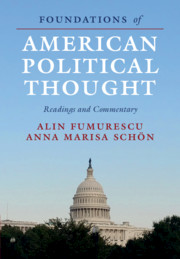Book contents
- Foundations of American Political Thought
- Foundations of American Political Thought
- Copyright page
- Contents
- Preface
- Acknowledgements
- 1 Introduction
- 2 Republicanism
- 3 Liberalism
- 4 The Puritans
- 5 Independence
- 6 The Positive Founding (I)
- 7 The Positive Founding (II)
- 8 The Whole and the Parties
- 9 People That Were Left Behind
- 10 The United States “Is”
- Index
- References
7 - The Positive Founding (II)
The People as One and Many
Published online by Cambridge University Press: 09 July 2021
- Foundations of American Political Thought
- Foundations of American Political Thought
- Copyright page
- Contents
- Preface
- Acknowledgements
- 1 Introduction
- 2 Republicanism
- 3 Liberalism
- 4 The Puritans
- 5 Independence
- 6 The Positive Founding (I)
- 7 The Positive Founding (II)
- 8 The Whole and the Parties
- 9 People That Were Left Behind
- 10 The United States “Is”
- Index
- References
Summary
Chapter 7 covers the federal constitutional debates and public debates on ratification, respectively. Substantial selections from Madison’s Notes of the Debates offer insight into the main subject of disagreement: Were the American people to be apprehended in their corporate capacity, at state level, or as a collection of individuals that happened to live various states? Corresponding to this theoretical dilemma, some delegates proposed the equal representation of the states in the national legislature, while others argued that the number of representatives should be based upon the population of each state. In the end, the Connecticut Plan offered a compromise between the two understandings of the people. In some respects, one could claim that the framers managed to recuperate and make permanent the Puritan legacy of the bi-dimensional covenant at a scale previously difficult to imagine. The second part of the chapter presents selections from both the Federalist Papers and the Anti-Federalists’ writings. These excerpts demonstrate the unique combination of theoretical perspectives in the American Constitution as well as lingering doubt about its practicality and legitimacy.
Keywords
- Type
- Chapter
- Information
- Foundations of American Political ThoughtReadings and Commentary, pp. 226 - 271Publisher: Cambridge University PressPrint publication year: 2021



